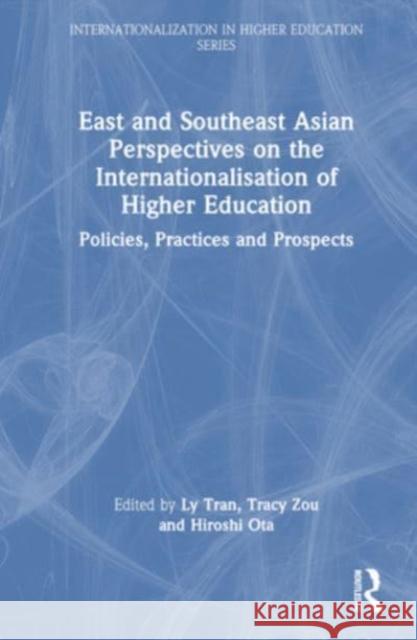East and Southeast Asian Perspectives on the Internationalisation of Higher Education » książka



East and Southeast Asian Perspectives on the Internationalisation of Higher Education
ISBN-13: 9780367767563 / Twarda / 2023 / 272 str.
East and Southeast Asian Perspectives on the Internationalisation of Higher Education
ISBN-13: 9780367767563 / Twarda / 2023 / 272 str.
(netto: 672,22 VAT: 5%)
Najniższa cena z 30 dni: 654,86 zł
ok. 22 dni roboczych
Bez gwarancji dostawy przed świętami
Darmowa dostawa!
This book provides robust insights into the current policies, trends, challenges and possibilities in the internationalisation of higher education in East and Southeast Asian countries, revealing emergent and new models and practices in this area.
Wydanie ilustrowane
“This important and timely book provides nuanced insights into current practices, possibilities and challenges in internationalisation in higher education in East and Southeast Asian countries. It includes the voices of both experienced and new researchers, providing unique and hitherto unheard Asian perspectives on core and new issues in the internationalisation of higher education. Topics such as decolonisation and the curriculum, internationalisation and power, the ideological challenges of EMI and the impact of COVID-19 on international education offer many possibilities for mutual learning across different HE systems, that will ultimately benefit students everywhere.”
Betty Leask, Emeritus Professor, La Trobe University, Melbourne, Australia
“Given Asia’s rise, this book is timely in documenting the developments that are taking place within the internationalisation of higher education in Asia. The editors’ incorporation of perspectives from upcoming researchers as well as under-researched regions, such as Laos and Cambodia, enhances equitability in both the dissemination of and access to new knowledge, making this book an invaluable resource for many.”
Tang T. Heng, Assistant Professor, National Institute of Education-Nanyang Technological University, Singapore
“This is a timely and fascinating volume on the Internationalisation of Higher Education in East and Southeast Asia, not only because it brings together experts from the various countries in the region to explain rationales, strategies, and practices, but also because it takes a comprehensive view of mobility, regional cooperation, and internationalisation of the curriculum initiatives in East and Southeast Asia. The book also deals with the prevalent aspects of transnational education at both the secondary (as pathway) and tertiary level (program and provider mobility). This is an absorbing must read for scholars and practitioners, particularly those setting out to collaborate with universities in the region.”
Robert Coelen, Emeritus Professor, Director of the Centre of Internationalisation of Education at the University of Groningen, Netherlands
“This book offers a remarkable exploration of the internationalization of higher education from East and Southeast Asian perspectives, presenting a cutting-edge analysis of the current trends in the field. It not only examines extensively internationalized higher education systems in the region, such as Singapore and Japan, but also sheds light on the emerging nations of Vietnam and Laos. Policymakers, researchers and practitioners in the field of international education are strongly recommended to read this invaluable resource.”
Hiep-Hung Pham, Director, Center for Research and Practice on Education, Phu Xuan University, Vietnam
“The book explores the multifaceted realities of higher education internationalization in East and Southeast Asia amidst evolving global dynamics, reflecting the intertwining of higher education and societal contexts. The authors argue convincingly that the qualitative and quantitative development of Asian higher education, rooted in its distinctive socio-cultural characteristics, has transformed global higher education trends in student mobility, international education curriculum, intercultural learning, and others. This challenges us to rethink the values of internationalization in higher education. This book will resonate with a wide range of stakeholders - from students and parents to university staff and leaders, policymakers, and higher education scholars in East Asia and around the world.”
Akiyoshi YONEZAWA, Professor and Vice-Director, International Strategy Office, Tohoku University, Japan
Part 1: Introduction
1. Internationalisation of higher education: The rise of East and Southeast Asia
Part 2: Internationalisation in HE in East Asia
2. Power in international higher education: The case of Malaysia
3. Internationalisation of Higher Education in Laos: Overview of Rationales and Strategies
4. Internationalisation of Higher Education in Vietnam: Policy, Practice, Opportunities and Challenges prior to and since COVID-19
5. Internationalisation of Higher Education in Indonesia: The past, present, and future
6. Internationalisation of higher education in Hong Kong: Opportunities and challenges in the Guangdong–Hong Kong–Macao Greater Bay Area
7. Understanding the Patterns and Context of the Internationalisation of Higher Education in South Korea
Part 3: Student mobilities and regional cooperation
8. Student mobility and East Asian regional cooperation
9. The developmental and state-driven logics in intra-Asia student mobilities: insights from Singapore’s ‘foreign talent’ scholarship schemes and China’s English-medium medical programs
10. Outbound Student Mobility from Southeast Asia: A Pull Factor Analysis
Part 4: Internationalising the curriculum, teaching and learning and English medium instruction
11. Internationalisation of the curriculum in Hong Kong: Trends, opportunities and challenges
12. Internationalizing or decolonising the curriculum? Exploring decolonization projects in Indonesian universities
13. English Medium Instruction (EMI) in Thai Higher Education: Policy, Structural, and Ideological Challenges
14. How Does Japanese Higher Education Cultivate Global Competence? Analysis of Student Survey in the Era of COVID-19
Part 5: Transnational education and pathways from international schools to elite international higher education
15. Think Local, Act Global: A Glocal Case Study on Reciprocal and Sustainable Transnational Higher Education in Singapore
16. Transnational Higher Education in Japan: Perspectives from International Program and Provider Mobility
17. Producing the ‘global elite’ at home through formatted mechanisms: Chinese students’ experiences in international schools
Ly Thi Tran is a Professor at the School of Education, Deakin University, Australia.
Tracy Zou is an Assistant Professor at the Department of Educational Administration and Policy, The Chinese University of Hong Kong (CUHK).
Hiroshi Ota is a Professor at the Center for General Education, Hitotsubashi University, Japan.
1997-2025 DolnySlask.com Agencja Internetowa
KrainaKsiazek.PL - Księgarnia Internetowa









